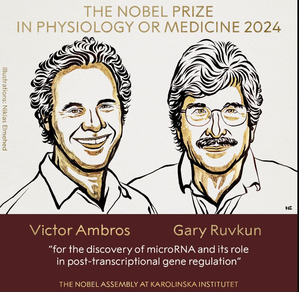America
Nobel Prize in Medicine Granted to US Scientists Victor Ambros and Gary Ruvkin

Stockholm, October 7:
For their work in identifying microRNAs—a novel class of small RNA molecules that are essential for gene regulation—Victor Ambros and Gary Ruvkun have been bestowed the Nobel Prize in physiology or medicine for the year 2024.
On Monday, the Nobel Prize committee made the announcement in Sweden. According to a news release from the Nobel Assembly, the scientists were given the Prize by the Karolinska Institutet for their revolutionary discovery in the tiny worm C. elegans, which has exposed a totally new concept of gene control.
For creatures with more than one cell, such as humans, this proved to be crucial. The role of microRNAs in development and function of organisms is becoming increasingly clear. The inconspicuous C. elegans, a roundworm just 1 mm long, was the subject of research by this year's medical laureates, Victor Ambros and Gary Ruvkun.
Because of its tiny size and abundance of specialised cell types—including nerve and muscle cells—found in larger, more sophisticated animals, C. elegans serves as a good model for studying the maturation and development of tissues in multicellular creatures.
The 1993 Nobel Prize winners revealed surprising results detailing a new level of gene control; this level was both very significant and conserved throughout evolution.
The data encoded in our DNA is like a handbook for every single cell in our body. Since all cells share the same chromosomes, it follows that all cells have the exact same set of instructions and genes.
The development of many cell kinds was of interest to Victor Ambros and Gary Ruvkun, this year's laureates. What causes the unique properties of various cell types, such nerve cells and muscle cells, and how do these differences manifest?
Gene regulation, which lets individual cells pick and choose which instructions to follow, is the key. This makes sure that every kind of cell is using the right collection of genes.
Cancer, diabetes, and autoimmune disorders are among the severe outcomes that can result from improper gene control. The Nobel committee remarked that for decades, researchers have sought to understand how genes are regulated.
Robert Horvitz, who shared the Nobel Prize in chemistry with Sydney Brenner and John Sulston in 2002, was a postdoctoral fellow at the group of Ruvkun and Ambros in the late 1980s.
Ambros spent the years 1979–1985 conducting postdoctoral research at the Massachusetts Institute of Technology (MIT) in Cambridge, MA, after earning his PhD in 1979. He was born in Hanover, New Hampshire, US.
When he joined Harvard University in 1985, he was already a Principal Investigator in Cambridge, Massachusetts.
Serving as the Silverman Professor of Natural Science at the University of Massachusetts Medical School in Worcester, MA, he formerly taught at Dartmouth Medical School from 1992 until 2007.
On the other hand, Ruvkun came into this world in 1952 in Berkeley, California, USA. He was a postdoctoral scholar at MIT in Cambridge, MA, from 1982 to 1985 after earning a PhD from Harvard University in 1982.
He is currently a professor of genetics at Harvard Medical School and Massachusetts General Hospital, where he joined in 1985 as a principal investigator.
Out of a total of 227 recipients, the medical prize has been bestowed 114 times. There have only been thirteen female recipients of the honor. In his bequest, Alfred Nobel included a third category for prizes, this one for medical or physiological research.
At Karolinska Institutet, the Nobel Assembly has been choosing the recipients of the Nobel Prize in Medicine every year since 1901.
The physics, chemistry, and literature Nobel prizes will be announced in the following weeks: Tuesday, Wednesday, and Thursday. Both the Nobel Peace Prize and the Nobel Prize in Economics will be announced on Friday and October 14, respectively.



































